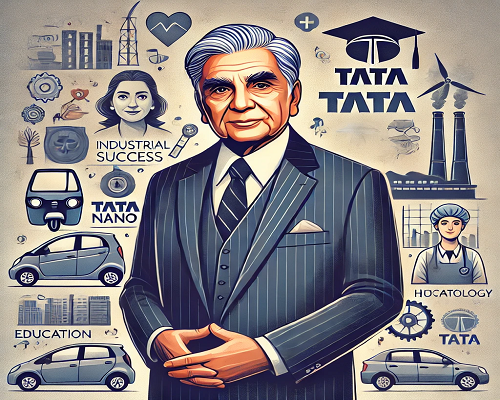Early Life and Education
Ratan Tata was born into one of India's most prominent families. He is the great-grandson of Jamsetji Tata, the founder of the Tata Group. Despite his privileged upbringing, Ratan Tata's journey was not devoid of challenges. After completing his schooling at the prestigious Cathedral and John Connon School in Mumbai, he pursued an undergraduate degree in architecture from Cornell University and later attended Harvard Business School for an advanced management program.His education abroad opened his eyes to the modern industrial world, but his heart remained dedicated to building and growing the Tata Group, which had become a symbol of national pride and global aspirations for India.
Ratan Tata’s Leadership at Tata Group
When Ratan Tata took over as chairman of Tata Sons in 1991, the conglomerate was already a force to reckon with in India. However, under his leadership, the group expanded exponentially, reaching new heights on the global stage. Some of his most iconic contributions include:Ratan Tata's Philanthropy: A Heart of Gold
While his business accomplishments are legendary, Ratan Tata's contributions to society are equally commendable. Known for his humility and compassion, he has been a strong advocate of corporate social responsibility and philanthropy. Through the Tata Trusts, Ratan Tata has donated a significant portion of his wealth to causes such as education, healthcare, rural development, and disaster relief.The Man of Unshakable Integrity
Ratan Tata is revered for his unwavering integrity. In a corporate world often clouded by scandals and controversies, he has always stood tall as a beacon of ethical leadership. One of the most famous instances that highlighted his commitment to values was the Tata Group's decision not to engage in unethical practices or bribes when they faced pressure in foreign markets. This decision, while costing the company short-term profits, cemented its reputation as one of the most ethical corporations globally.Honors and Recognition
Over the years, Ratan Tata has received numerous awards and recognitions, including:A Legacy for Generations
Ratan Tata’s life is a shining example of what it means to lead with purpose, passion, and integrity. His legacy goes beyond corporate boardrooms and profit margins. It is etched in the hearts of millions of people whose lives have been touched by his generosity, foresight, and ethical leadership.For generations to come, Ratan Tata will be remembered not just as an industrialist, but as a man who led by example, a leader who proved that doing good for society and doing well in business can go hand-in-hand.



0 comments